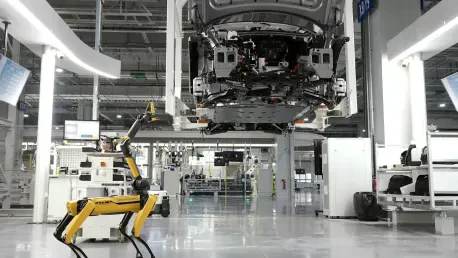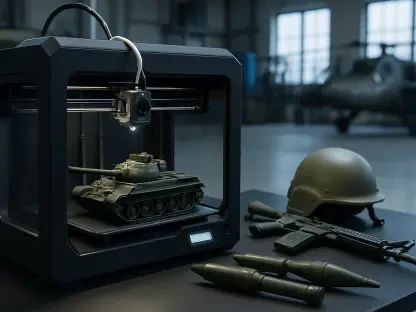In an era where the automotive industry faces relentless pressure to innovate and optimize, Lear Corporation, a leading Tier 1 supplier based in Southfield, Michigan, is charting a transformative path through a strategic partnership with Palantir Technologies. Announced on September 4 as a five-year collaboration, this alliance integrates Palantir’s advanced AI tools, including the “Warp Speed” manufacturing operating system and the Artificial Intelligence Platform (AIP), into Lear’s sprawling global operations. The goal is nothing short of a revolution in manufacturing, targeting enhanced efficiency, streamlined processes, and cutting-edge innovation across critical areas such as supply chain management, quality control, and product design. This partnership positions Lear at the forefront of digital transformation, promising to redefine how automotive components are produced in a highly competitive market. As technology continues to reshape traditional industries, this collaboration offers a glimpse into the future of manufacturing excellence.
Embracing Digital Transformation
Lear’s journey toward modernization is deeply rooted in its “Innovative, Digital, Engineered, and Automated” (IDEA) program, which began taking shape with Palantir’s involvement a couple of years ago. This initiative focuses on digitizing manufacturing operations by leveraging Palantir’s Foundry platform to create tailored applications. These tools enable the deployment of AI-driven machine learning models that address intricate challenges, from optimizing supply chains to predicting equipment maintenance needs. By automating routine tasks and enhancing decision-making with data insights, Lear aims to maintain agility in an industry where speed and precision are paramount. The IDEA program isn’t just about adopting new technology; it’s about fundamentally rethinking how a traditional manufacturer operates in a digital age, ensuring that every process is as efficient and responsive as possible to meet the evolving demands of automotive production.
Beyond the technical integration, this digital shift represents a cultural and strategic pivot for Lear. The partnership with Palantir empowers the company to break away from legacy systems that often hinder scalability and adaptability. With AI at the core of operations, Lear can analyze vast amounts of data in real time, identifying inefficiencies and opportunities that would otherwise remain hidden. This capability is particularly vital in a global network where coordination across regions can be daunting. The emphasis on digital transformation also signals to industry peers that embracing technology isn’t merely an option but a necessity for staying relevant. As Lear continues to refine its approach through the IDEA framework, it sets a benchmark for how manufacturers can harness AI to not only solve current problems but also anticipate future challenges in an ever-changing landscape.
Boosting Efficiency and Financial Gains
One of the most immediate and tangible outcomes of Lear’s collaboration with Palantir is the remarkable improvement in operational efficiency. Through the IDEA program, supported by Palantir’s sophisticated technology, Lear has already achieved savings exceeding $30 million in the first half of this year, with projections indicating further financial benefits as the partnership progresses. These cost reductions stem from streamlined processes that minimize waste and optimize resource allocation across the company’s extensive manufacturing network. By integrating AI into daily operations, Lear can respond more swiftly to market fluctuations and customer demands, ensuring that production lines run smoothly without unnecessary downtime or overexpenditure. This financial impact underscores the power of technology to deliver measurable results in a sector often constrained by tight margins.
Moreover, the efficiency gains extend beyond mere cost savings to reshape how Lear approaches scalability and growth. With AI-driven insights, the company can pinpoint bottlenecks in production or supply chains before they escalate into costly disruptions. This proactive stance allows for better planning and resource management, ensuring that Lear remains a reliable partner to major automakers worldwide. The financial benefits also provide a buffer to invest in further innovation, creating a virtuous cycle where savings fuel technological advancements, which in turn drive more efficiency. As these savings accumulate, they highlight a critical lesson for the industry: strategic investments in AI can yield substantial returns, transforming what might seem like an upfront expense into a long-term competitive advantage that redefines operational standards.
Pioneering the Future of Manufacturing
Palantir’s leadership, including CEO Alex Karp, has positioned this collaboration as a showcase for the “Warp Speed” system, heralding Lear as a trailblazer in developing “manufacturing plants of the future.” By embedding AI directly into the production environment, Lear is modernizing its facilities to handle the intricacies of contemporary automotive manufacturing. This isn’t just about upgrading machinery or software; it’s about creating an ecosystem where data drives every decision, from the factory floor to the executive suite. Such an approach ensures that production processes are not only faster but also smarter, capable of adapting to unexpected challenges with minimal human intervention. This vision of futuristic plants signals a broader shift in manufacturing, where technology becomes the backbone of operational excellence.
The implications of building these advanced facilities go far beyond Lear’s own operations. As a leader in the automotive supply chain, Lear’s adoption of such cutting-edge systems could inspire a ripple effect across the industry, encouraging other manufacturers to rethink their own strategies. The integration of AI on the production floor allows for real-time monitoring and adjustments, ensuring that quality remains consistent even as production scales. This level of precision is especially crucial in an era where vehicles incorporate increasingly complex components like hybrid systems. By pioneering this model, Lear not only enhances its reputation as an innovator but also sets a precedent for how technology can elevate traditional industries, potentially reshaping expectations for what a modern manufacturing plant should achieve in terms of efficiency and adaptability.
Addressing Complex Industry Challenges
Serving major automakers like Ford, General Motors, and BMW, Lear operates under intense pressure to deliver top-tier components for vehicles that are becoming ever more technologically advanced, including hybrid and electric systems. Palantir’s data-driven solutions play a critical role in managing this complexity, optimizing processes from quality assurance to procurement. AI tools enable Lear to maintain stringent standards while juggling the diverse requirements of multiple clients across the globe. This capability is vital in an industry where even minor errors can lead to significant setbacks, both in terms of cost and reputation. By harnessing technology to address these challenges, Lear ensures it remains a trusted partner in the automotive ecosystem, capable of meeting the sophisticated demands of modern vehicle production.
Additionally, the partnership tackles the broader trend of increasing complexity in supply chains, where disruptions can cascade through the entire production cycle. Palantir’s platforms provide predictive analytics that help Lear anticipate potential issues, whether they stem from supplier delays or fluctuating raw material costs. This foresight allows the company to mitigate risks before they impact delivery schedules or product quality. The focus on innovation through AI also positions Lear to stay ahead of regulatory and environmental demands, such as those tied to sustainable manufacturing practices. As the automotive sector continues to evolve, this strategic use of technology equips Lear to navigate uncharted territory, ensuring that it not only meets current expectations but also shapes future standards for efficiency and responsibility in manufacturing.
Setting a Precedent for Industry Partnerships
The alliance between Lear and Palantir exemplifies the growing significance of cross-industry collaborations between traditional manufacturers and technology innovators. Since its founding in 2003, Palantir has built a reputation for expertise in data analytics, offering a fresh perspective through which to address longstanding manufacturing challenges. This synergy demonstrates how combining established operational know-how with advanced AI can unlock unprecedented levels of productivity. For Lear, this partnership provides access to tools that transform raw data into actionable insights, while for Palantir, it offers a proving ground for its platforms in a high-stakes industrial context. Such collaborations highlight a pathway for other manufacturers to modernize without abandoning their core strengths.
Furthermore, this partnership serves as a model that could influence the broader automotive supply chain. As other companies observe the tangible benefits Lear reaps from integrating AI—such as cost reductions and enhanced agility—they may be prompted to seek similar alliances with tech providers. This trend toward collaboration reflects a recognition that no single entity can navigate the complexities of modern industry alone. By bridging the gap between legacy processes and cutting-edge solutions, Lear and Palantir illustrate the potential for transformative change when diverse expertise converges. The success of this alliance could catalyze a wave of innovation, encouraging a shift where technology partnerships become a cornerstone of competitive strategy in manufacturing, ultimately benefiting the entire sector.
Reflecting on a Transformative Alliance
Looking back, the strategic partnership between Lear Corporation and Palantir Technologies marked a defining moment in the evolution of automotive manufacturing. Over the course of their collaboration, the integration of Palantir’s “Warp Speed” and AIP platforms into Lear’s global operations drove significant strides in efficiency and automation through the IDEA program. The reported savings of over $30 million in just the first half of the year stood as a testament to the immediate impact of AI-driven innovation. Moving forward, the industry can draw inspiration from this alliance by exploring similar technology partnerships to address operational challenges. As Lear paved the way with its vision of “manufacturing plants of the future,” the focus should shift to scaling such innovations across other sectors, ensuring that digital transformation becomes a shared goal. This journey highlighted the power of collaboration, offering a roadmap for balancing tradition with progress in an ever-evolving industrial landscape.









